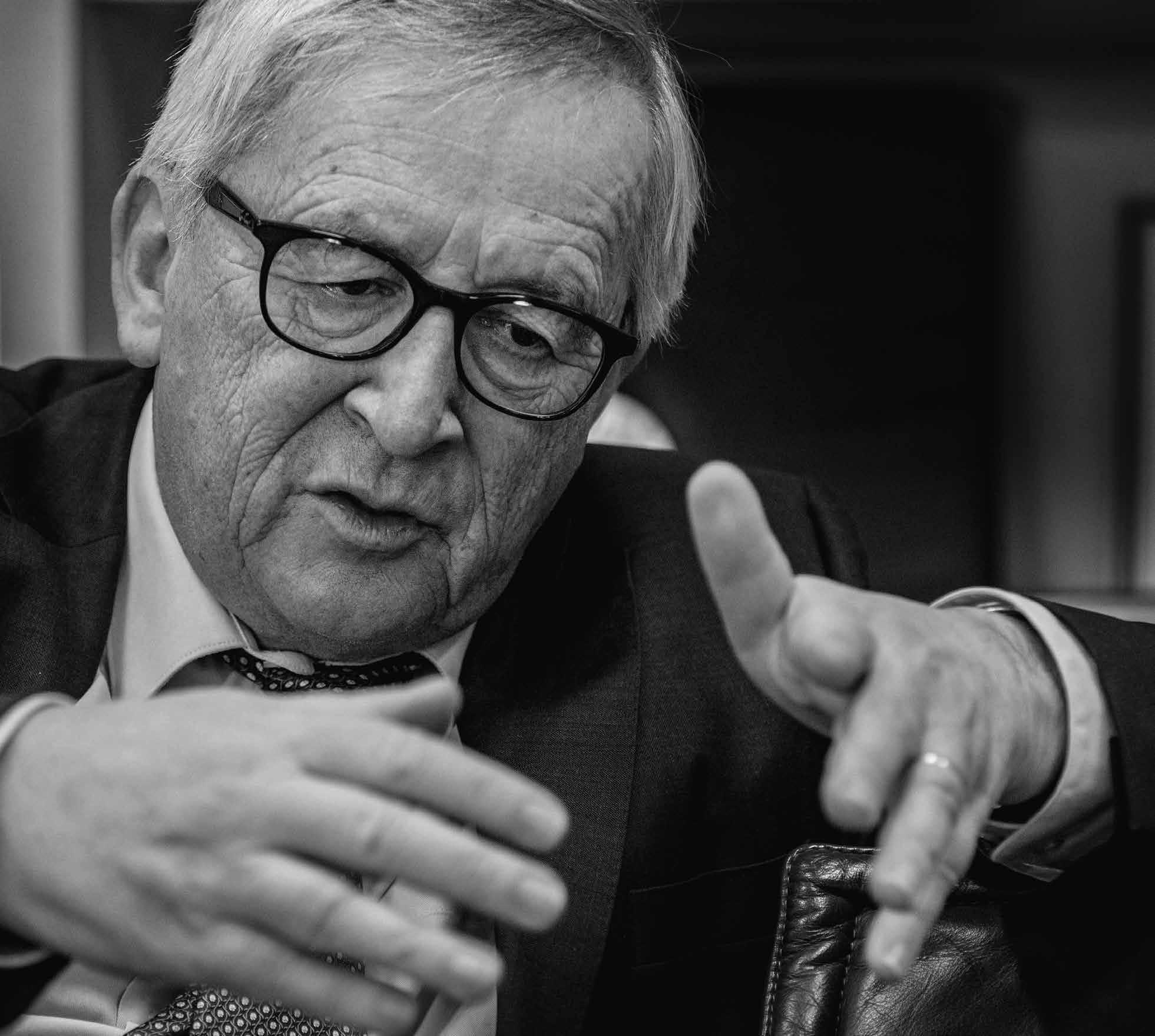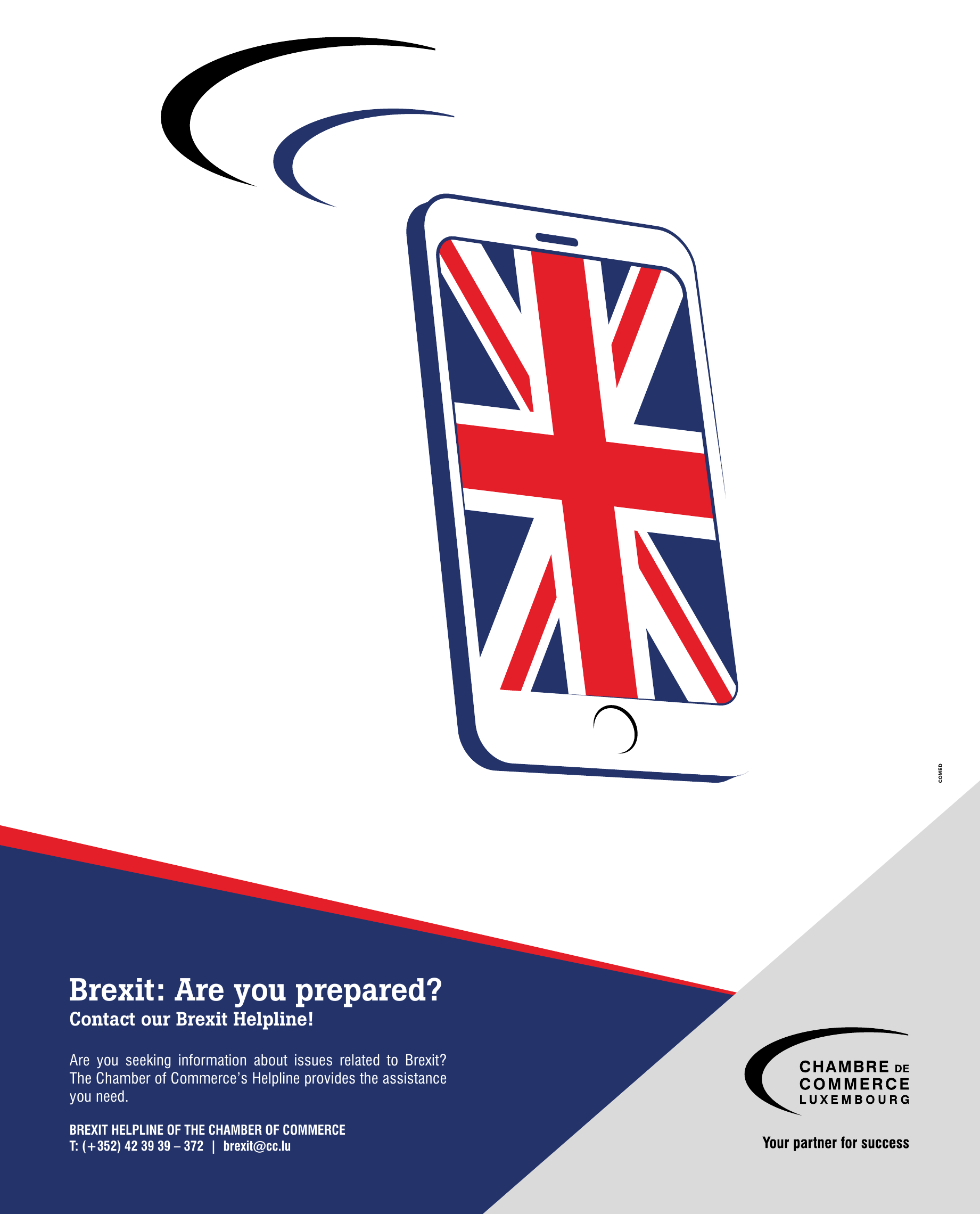The most visible politician of the European Union on what went well and what didn’t during his time at the head of the European Commission. Jean-Claude Juncker also responds to populist voters, and talks about his relationship with Donald Trump.
By Douwe Miedema and Yannick Lambert
You have roughly half a year left in your role as Commission President. How would you describe your legacy?
Everyone who says the Commission is so much out of breath it is no longer able to run, is wrong. I will make up the balance when the time is there. For now there is still a lot to do. We have come up with many proposals. Everything people thought needed to be done is now with the co-legislators – the European Parliament and the Council.

Are there also things that didn’t go so well?
A lot that is stuck in the desert isn’t due to a lack of ability of the Commission, but of the Council. Not so much Parliament, which has been a loyal partner.
I am very sad that the member states have not yet managed to agree on reforming the asylum system. When I assumed office, many people did not listen to me, or mocked me. Now we know that, had we implemented the Commission proposals from 2015, we wouldn’t have come to a halt mid-way.
Concerning deepening of the Economic and Monetary Union, we came up with all the proposals that were needed, but here as well, the Council is struggling tremendously. The same is true for tax issues, which are also stuck in endless deliberations of the Council of ministers.
Luxembourg wasn’t exactly in favour of giving up national prerogatives when you were prime minister of the country. Are we watching Juncker vs Juncker?
The Commission proposal to vote with qualified majority on tax issues is meeting some opposition. It is intriguing, that of all people, a former Luxembourgish Prime Minister and Finance Minister is so active in tax matters. Back in the day, it was easy to say that Juncker is blocking every fiscal proposal for Europe. Now I notice that Juncker himself is being blocked. Well, so be it.
Why are you pushing for it now, when you weren’t back then?
You should read my speeches from the 90s. I argued in favour of qualified majority voting, and for ending banking secrecy. But I was always part of coalition governments.
Globalisation is causing rapid changes. When you rely on unanimity, you can’t react quickly. But qualified majority voting doesn’t mean that you cannot disagree before you vote. On the contrary.
In polls, a positive view about Europe has increased significantly over the past four years, with 62 percent of Europeans backing the EU – a 25-year record. Nevertheless, populist parties stand to make big gains in the upcoming elections. Is Europe losing its ability to convince voters?
We need to continue our efforts to close the gap between the people of Europe and the European institutions, which hasn’t become smaller despite all our efforts.
We had planned to focus on the big things, to be ‘big on big’ and to hold back on smaller topics – and we achieved that. But only a few recognise it. Everybody is still saying the Commission gets involved in small, everday issues. But with me, that’s no longer the case.
Still, it is too easy to say that everyone who asks a critical question about Europe is a populist. There is justified criticism on European politics. If I were to open a catalogue of questions, doubts, fears and unsolved questions about the future of Europe, my list would be longer than that of any populist. I am not a naïve EU integration fanatic. I see things the way ordinary people see them.
“Much of what the commission proposed is stuck between countries”
How should Europe engage with these critics?
We don’t know what the next European Parliament will look like, but it is to be expected that the extremes will grow stronger. What unites these forces is a nervous effort to ask questions without wanting – or being able – to find an answer. You see this mainly on the far-right.
And contrary to what people tell me, not to engage with those voices, I am of a strictly opposite opinion. The danger from the far right needs to be fought continuously, every day.

But if such EU critics are elected, isn’t that because people want it? Should parliament not just be given the right of initiative?
Do you think that a parliamentary right of initiative would strengthen a social Europe? That such a parliament would grant more rights to people coming from afar, refugees and migrants?
Granting parliament the right of initiative might well lead to regression in Europe, not progress. As long as the Commission has the sole right of initiative, one can expect that European topics will be at the heart of it. I am not against a right of initiative for the European Parliament. But I don’t share the hope that it would accelerate or even improve the processes in Europe.
A perceived loss of control may also have to do with rising income inequality. Protestors blame globalisation for that, driven by supranational institutions such as the EU.
I’m not a globalisation fanatic, because I also see the negative aspects. We shouldn’t fight it but shape it. Globalisation has reduced poverty. Just look at the third world.
Some would say the crisis in Greece was solved for economic reasons that went far beyond the country. Not to show solidarity with ordinary Greeks.
I have always said that it made sense to keep Greece in the euro, at the same time stressing that the dignity of the Greek people had to be respected. Greece had economic, financial and budgetary problems that needed to be solved, and a complete inability to reform itself.
But I have always been against blaming ordinary Greeks, and there’s many of them – often poor, especially in the cities. I used to call just people I personally know in Greece three times a week, and asked them to describe their lives to me. I discovered a lot that you couldn’t find in the files.
So what would you say to the gilets jaunes?
Those protests have nothing to do with Europe, even though people are pretending they do. This is about internal French politics. If you – who observe and look at the world critically – can explain to me in three simple points what the gilets jaunes want to achieve, you would be awarded the Nobel Prize for editorial simplification. I do take it seriously. The issue isn’t limited to France, but I just try to understand what these yellow vests say. Every time I see a yellow vest on television, they state the exact opposite of what the previous one said.
Another issue: how do you see the relation with the US developing under Trump?
If everybody just looks after themselves, the world becomes more and more prone to conflict. It may be that it is easier for the US to do so than for others. But you also have to be careful not to turn ‘America first’ into ‘America alone’. Americans need allies, partners and friends and we explain this to them in clear German sentences delivered to them in English.
“Gilets jaunes protests have nothing to do with Europe”
How does Trump respond to that?
It is widely known that I have a good relationship with him. And I will not mess this up by making careless revelations to you.
How often do you speak to him?
Regularly. On 25 July we managed to put the brakes on an approaching trade war. I speak to him in such a way that he has abstained from that trade war for now, or even completely.
But I will not initiate you into the art of how to achieve those things. Because if others were to try it, it wouldn’t end well.
Despite your personal rapport, translatlantic relations clearly have been better in the past.
I agree that transatlantic relations have entered a cooling-down phase since Trump got elected. But you also have to see that by now, he has revised many of the general accusations he launched when he assumed office.
The cooling down was one of the reasons that The Commission’s plans for a European Defence Union met with greater approval than would have been the case for four or five years. Many Europeans are seeing that we must take care of our own security – not exclusively, but to a degree. So there’s a bright side to everything.

Juncker leaves office in November
Should Europe become more assertive in security matters?
In Great Britain as well as in Europe, there is a consensus view that we should cooperate. Not against each other, but to be able to stand our ground when others are heading in a completely different direction than we do.
Our proposal – my proposal – to decide on tax matters with a qualified majority also extends to foreign policy matters. Not for every tax issue, and not for every foreign policy issue. Those two things go together. You need to do two things: strengthen European sovereignty, and not mess it up at the national level.
There is the added complication of the relation with the UK after Brexit.
What I find striking is that the unity of the other 27 member states has become greater after the Brexit vote in the UK. The Commission has contributed a lot to that.
It is now clear that the things that Johnsons and the Farages of this world have said leading up to the vote were null and void. The Brits did not have a proper debate before the referendum about whether to stay in the European Union. And that just shows that there is an urge in populism that kills all other forces, the ones that don’t drift along in this populist stream.
And Russia?
Russia doesn’t see itself as a regional power, and I don’t either. We need to see eye to eye with them. The fact that we don’t, is one of the biggest mistakes in the diplomatic efforts from Europe and the US. I am of the opinion that without Russia there cannot be a permanent, solid security architecture that has its tentacles everywhere. I am in favour of engaging with Russia, of course without making the mistake of sugar coating their flaws, which is something that many people do.
“I have the oceans before me, I don’t need the Mosel.”
With all these challenges ahead, how can we convince young people that European integration is worth it?
People tell me all the time I shouldn’t talk about the war. But I can see that whenever one raises this theme of war and peace, young people will listen to you. Whenever you raise the topic of Europe in the period just after the war, there is always an audience.
But you should also talk about Europe’s future, and I want to do that all the time. At the beginning of the 20th century, 25 percent of the world population were Europeans. Now it is five or six percent. At the end of this century it will only be four percent.

A final question. Will we see you back in Luxembourg politics?
I have the oceans before me, I don’t need the Mosel. Which by the way, I like a lot. No, I will not return to politics in Luxembourg. That is out of the question.
Luxembourg will be the subject of the second part of my memoirs. But that will appear only when the main perpetrators lie under the earth. So I still have some time.